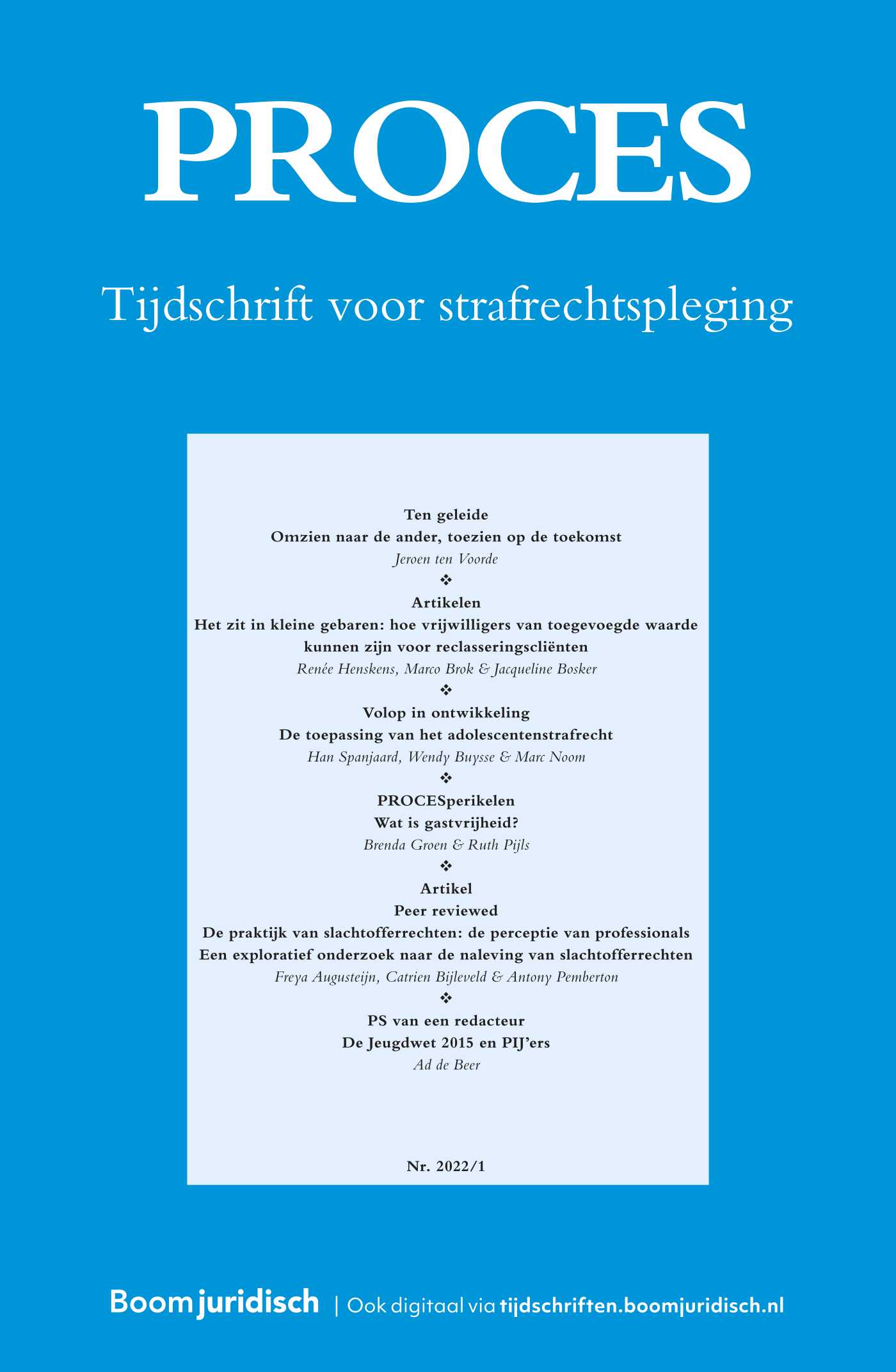|
There is an impressive body of literature dealing with the so-called ‘cruelty link’. Two directions can be distinguished: animal abuse as a part of domestic violence and cruelty against animals as a predictor of a penchant for violence in later life. Related to these topics are a lot of methodological problems, for example regarding research designs, definitions of (domestic) violence and animal abuse, practices of cultural bias and prejudice regarding the position of animals in society and problems regarding the recognition of abuse. This contribution deals further more with the problematic claims of correlation and causation between violence against humans and animals. What is the risk of identifying ‘false positives’, that is making uncritical assumptions and accusations of (a penchant for) violent behaviour based on the (mis)interpretation of certain behaviour against animals? |


PROCES
Meer op het gebied van Criminologie en veiligheid
Over dit tijdschriftMeld u zich hier aan voor de attendering op dit tijdschrift zodat u direct een mail ontvangt als er een nieuw digitaal nummer is verschenen en u de artikelen online kunt lezen.
| Redactioneel |
O tempora, o mores! |
| Auteurs | Mr. dr. Maartje van der Woude |
| Auteursinformatie |
| Artikel |
Geweld tegen mensen en dierenDenken over correlatie, causatie en de angst voor valse positieven |
| Trefwoorden | (domestic) violence, animals, research methodology, prevention |
| Auteurs | Dr. Janine Janssen |
| SamenvattingAuteursinformatie |
| Artikel |
Intelligencegestuurd politiewerk: een maturity model |
| Trefwoorden | intelligence led policing, maturity model, information, deciding |
| Auteurs | Dr. ir. Mariëlle den Hengst |
| SamenvattingAuteursinformatie |
|
Intelligence Led Policing (ILP) is an increasingly important concept for policing. ILP is about analyzing information and knowledge and using these analyses to support decision making about police work. The implementation of ILP is characterized by different stages of development. In this paper we describe each stage by five aspects. The stages are: intuition, justify actions, guiding actions and prescribing actions. The five aspects are: collecting information, analyzing information, presenting analyses, interaction and using analyses. |
| Praktijk |
Binnen zonder kloppen?Over onderzoek naar immigratiewetgeving in Arizona |
| Auteurs | MSc. Rolf van Wegberg, Marten Zoetbrood en Michiel Glas |
| Auteursinformatie |
| Artikel |
Schoolverzuimers hebben al genoeg problemen |
| Trefwoorden | truancy, school refusal, juvenile delinquency, risk factors |
| Auteurs | MSc. Myrte van Veldhuizen |
| SamenvattingAuteursinformatie |
|
Truancy is connected with early dropout and juvenile delinquency. In order to find effective ways in dealing with truants, it is necessary to investigate the problems truants are experiencing at different levels (for example in the family and at school). This article shows the results of a research analyzing 225 school refusal cases from the location Rotterdam of the Dutch Child Protection Service. All truants suffer from risk factors on different levels and have relatively little protective factors. Children in the ‘civil group’ show significantly more problems than children in the ‘pure refusal group’ and children in the ‘crime group’. Because most truants suffer from a cumulation of problems they need focussed assistance rather than punishment. |
| Artikel |
Het adolescentenrecht; nut en noodzaak?Een verslag van het symposium van de Rechtbank Rotterdam van 15 maart 2012 |
| Trefwoorden | adolescent law, legislative proposal, symposium, juvenile law |
| Auteurs | LL.B BSc Celesta Bonnet |
| SamenvattingAuteursinformatie |
|
Recently, a legislative proposal concerning adolescent criminal law is published. This proposal focuses on an offender-oriented approach towards youth risk and offers a coherent package of measures aiming at persons aged 15 to 23 and therefore aims to improve the flexibility in imposing sanctions around the age limit of 18 years. During the symposium of District Court Rotterdam of March 15, 2012, juvenile law experts commented on the proposal from different perspectives. |
| Column |
In het belang van de cliënt |
| Auteurs | Mr. Coosje Peterse |
| SamenvattingAuteursinformatie |
|
In a column a journal editor or an author expresses his or her opinion on a particular subject. |
